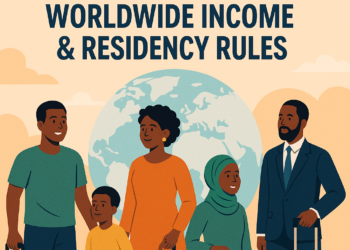Polygamy is like a birthright to the men in a traditional African society. A man is at liberty to marry as many women is he so wishes and is able bring home under his roof. The ability here is not actually in terms of financial capability to maintain all the women in a large family. It is rather if he has the ability to get the women to agree to follow him home.
If he is able to get them to say yes, then it is inconsequential whether he actually has the ability to maintain the women. The initial requirements for traditional marriage rite in some African communities are noted, but it is hardly a barrier to a man who has already proven the ability to put his woman in the family way. The moment she gets pregnant many other conditionality in the traditional marriage rite can be compromised.
This is exactly why the poor and illiterate population in Africa tends to marry more wives and bear more children than the rich and educated elites. Most times in this societal cadre of individuals little questions are asked, and there are hardly any formalities observed. You may not even get to hear of the marriage before you hear of the baby shower.
“The Marriage Act did not outlaw the traditional marriage institution and no law in Nigeria have done so as at date. Even the Islamic marriage is an institutional polygamy, only that it caps the man`s connubial expansion to 4 wives in his life time. So, technically polygamy and monogamy both coexist in Nigeria till date.”
Further, before the advent of Christianity which the Whiteman brought into the continent, the idea of feminism, monogamy, husband cheating on his wife, and all that where far from our thoughts and imaginations. It was entirely the man`s world and he was the lord and master in his miniature kingdom of a man and as many wives as there were. Yet, everyone was happy and got along very well.
When the white man came, he thought our people the concept of monogamy and all the teachings of Christianity. With this gradually grew the teachings around the right of women in the marriage institution and in the wider world. This “imported” culture further led to a wave of feminist movements which today has continued to grow in lips and bounds.
But how far has all these gone in advancing the concept of monogamy over polygamy in Africa as a way of life for the people?
Admitted, the Christian religion have affected the marriage institution in many ways. Can we really say that this effect has been fundamental or revolutionary enough to supplant the overwhelming advantages a man enjoyed over the years in a typical traditional matrimonial union? Your views here may vary, but the reality will always converge.
The Christian marriage teachings made their way into the law books in African countries. Take for instance, in Nigeria, a specific reference is the Nigerian civil marriage law codified in the Marriage Act and the Marital Courses Act. The monogamous system of marriage tried to entrench its superiority and dominance over the traditional polygamy, but how far did it go?
“The only legal requirement for a man to contract a valid marriage under the Act, is that he must do so with only one of the litany of wives already in his bed. But as a matter of law, he is still permitted to retain the others. The preachers of the Holy Gospel will certainly not agree with this position, but the law is a different thing from morality. Sadly, this is the case.”
The Marriage Act did not outlaw the traditional marriage institution and no law in Nigeria has done so as at date. Even the Islamic marriage is an institutional polygamy, only that it caps the man`s connubial expansion to 4 wives in his life time. So, technically, polygamy and monogamy both coexist in Nigeria till date.
The only legal requirement for a man to contract a valid marriage under the Act, is that he must do so with only one of the litany of wives already in his bed. But as a matter of law, he is still permitted to retain the others. The preachers of the Holy Gospel will certainly not agree with this position, but the law is a different thing from morality. Sadly, this is the case.
Now, one may ask – what`s all the fuss about?
And the response will be – if a man has not lost his “traditional right” to have as many women as he so pleases and covert as many as he wants as his wife, how then can you accuse any husband in Nigeria of cheating on his wife?
No law has criminalized adultery or infidelity, and that is true both for the man and the woman. However, the norms, traditions and cultures in Africa forbids extra-marital affairs, but only for the woman. It does not just prohibit adultery for the woman, but it also prescribes severe retribution for it. For the man tradition and culture does not only permit it, but also encourages it. In fact, the size of a man`s family including the number of wives was contributory to his farming workforce, and farm produce was and still a status symbol till date.
So, in reality there is certainly no legal ground to hold neither a husband nor his wife for adultery. In Nigeria there is no offence known to Apostle Paul as adultery or extra marital affair. However, for the wife the culture and tradition of her own people is very unfair to her. While it denies her the right to extra-marital affairs, it guarantees the same right on a platter of gold for the husband.
Notwithstanding the perceived disadvantaged position of the wife, there is still away she can have things under control. This is a special discussion by Apostle Paul to dissuade any idea that AP supports or encourages husbands to cheat because cultural milieu allows them to. The woman can still hold things together by been a true life support to the man and not a hip of liability in the house. You can read up the discussion here
The situation however, may be changing in a country like South Africa, where women are likely going to be able to enjoy polyandry, which is the right to lawfully marry as many men as they want. If this happens then the feminists would have scored another point and added yet another feather to their towering cap of momentous achievements.
Dear readers, I like to get your views. Kindly let me know your reactions to the issues I have discussed. You do not have to agree with me on any of the points. I have actually not expressed any view but addressed the facts as they are. Let me know what you agree or disagree with in the comment section below.
Written by Apostle Paul, also known as AP. AP is a prolific writer and writes on various issues about marriage and family life, entrepreneurship, personal finance and lifestyle.












